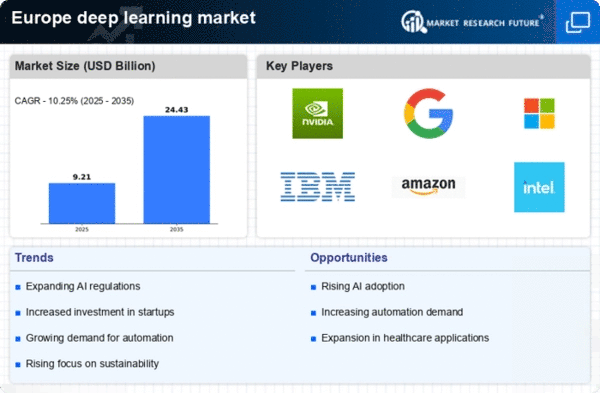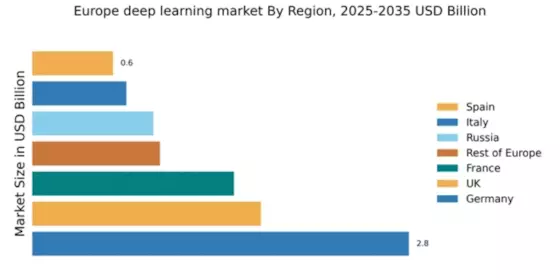Rising Demand for Automation
The deep learning market in Europe experiences a notable surge in demand for automation across various sectors, including manufacturing, healthcare, and finance. This trend is driven by the need for efficiency and cost reduction, as organizations seek to streamline operations. According to recent data, the automation market is projected to grow at a CAGR of 25% through 2027, indicating a strong correlation with advancements in deep learning technologies. As companies increasingly adopt automated solutions, the deep learning market is poised to benefit significantly, with applications ranging from predictive maintenance to intelligent process automation. This rising demand for automation not only enhances productivity but also fosters innovation, creating a fertile ground for deep learning solutions to thrive.
Advancements in Computational Power
The deep learning market in Europe is significantly influenced by advancements in computational power, particularly through the development of specialized hardware such as GPUs and TPUs. These technologies enable the processing of vast datasets, which is essential for training complex deep learning models. As of 2025, the market for AI hardware is expected to reach €10 billion, reflecting a growing investment in infrastructure that supports deep learning applications. Enhanced computational capabilities allow for more sophisticated algorithms and faster training times, which in turn accelerates the deployment of deep learning solutions across various industries. This trend suggests that as computational power continues to evolve, the deep learning market will likely expand, offering new opportunities for innovation and application.
Increased Focus on Data Privacy Regulations
The deep learning market in Europe is currently navigating a landscape shaped by stringent data privacy regulations, such as the General Data Protection Regulation (GDPR). These regulations necessitate that organizations employing deep learning technologies ensure compliance while handling personal data. As companies adapt to these legal frameworks, there is a growing emphasis on developing privacy-preserving deep learning models. This shift not only influences the design and implementation of deep learning solutions but also drives innovation in areas such as federated learning and differential privacy. The market for privacy-focused AI solutions is projected to grow by 30% annually, indicating a robust demand for compliant deep learning applications that respect user privacy while delivering value.
Expansion of Cloud-Based Deep Learning Services
The deep learning market in Europe is witnessing a significant expansion of cloud-based services, which facilitate the accessibility and scalability of deep learning solutions. Major cloud providers are increasingly offering specialized platforms that support deep learning frameworks, enabling businesses to leverage advanced analytics without substantial upfront investments. As of 2025, the cloud computing market in Europe is expected to exceed €100 billion, with a substantial portion attributed to AI and deep learning services. This trend indicates that organizations can rapidly deploy and iterate on deep learning models, fostering innovation and collaboration. The proliferation of cloud-based services is likely to democratize access to deep learning technologies, allowing smaller enterprises to compete alongside larger corporations.
Growing Interest in AI-Driven Healthcare Solutions
The deep learning market in Europe is experiencing a surge in interest regarding AI-driven healthcare solutions, particularly in diagnostics, treatment planning, and patient management. The healthcare sector is increasingly adopting deep learning technologies to enhance decision-making processes and improve patient outcomes. Recent studies suggest that the market for AI in healthcare could reach €20 billion by 2027, driven by the need for more efficient and accurate medical solutions. This growing interest is likely to propel the development of innovative deep learning applications, such as image recognition for medical imaging and predictive analytics for patient care. As healthcare providers seek to harness the power of AI, the deep learning market is expected to expand, offering new avenues for research and application.


















